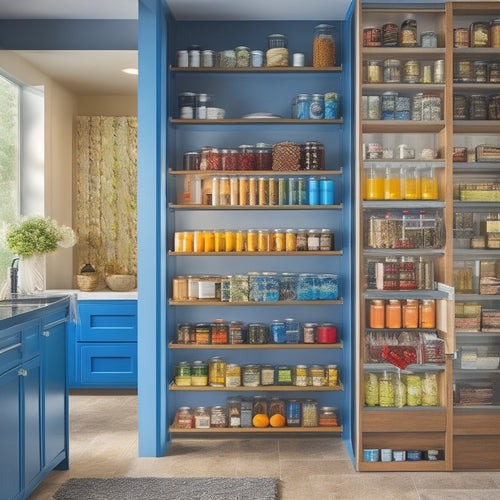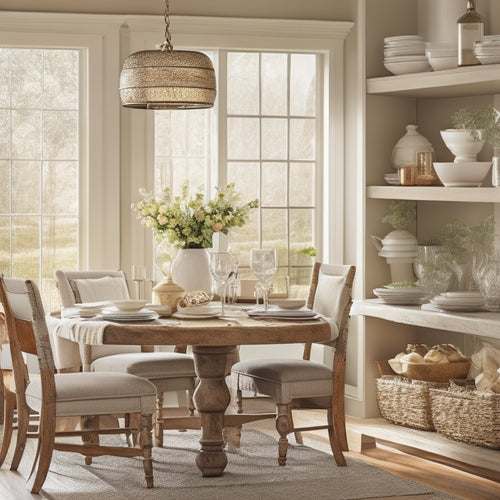
3 Essential Tips for Efficient Kitchen Meal Planning
Share
To plan meals efficiently, you'll want to start by streamlining your kitchen space, maximizing meal prep efficiency, and simplifying your grocery routine. Dedicate zones in your kitchen to optimize workflow, and organize pantry items by type and frequency of use. Next, implement time-saving techniques like batch cooking and use compartmentalized containers. Finally, make a grocery list and meal plan before shopping, and organize your list by aisle to prevent impulse buys. By following these essential tips, you'll be well on your way to transforming your cooking process - and there's even more to discover to take your meal planning to the next level.
Key Takeaways
• Dedicate kitchen zones for food prep, cooking, and storage to optimize workflow and reduce clutter.
• Implement time-saving meal prep techniques like batch cooking to prepare meal components in advance.
• Organize pantry items by type and frequency of use, and utilize vertical space for infrequently used items.
• Create a grocery list and meal plan to avoid impulse buys, reduce food waste, and stick to your budget.
• Focus on planning healthy, balanced meals that can be quickly executed on busy days with minimal prep work.
Streamline Your Kitchen Space
Optimize your kitchen's workflow by dedicating specific zones to food preparation, cooking, and storage, thereby minimizing clutter and maximizing efficiency.
By doing so, you'll create a safer and more functional kitchen environment.
Start by organizing your pantry, categorizing items by type and frequency of use. This will help you quickly locate what you need, reducing meal prep time and eliminating the risk of expired or spoiled ingredients.
Next, utilize vertical space by installing shelves, hooks, or a pegboard to store infrequently used items, such as special occasion dishes or cooking gadgets. This will free up valuable counter and cabinet space for everyday essentials.
By streamlining your kitchen space, you'll reduce the risk of accidents caused by clutter and improve your overall cooking experience.
A well-organized kitchen also allows you to focus on meal planning and preparation, ensuring you're serving healthy, nutritious meals to yourself and your loved ones.
Maximize Meal Prep Efficiency
By streamlining your kitchen space, you've set the stage for efficient meal prep, and now it's time to turn your attention to planning and preparing healthy, balanced meals that can be quickly executed during busy weekdays.
To maximize meal prep efficiency, focus on time-saving techniques that minimize prep work and cooking time. One effective strategy is batch cooking, where you prepare large quantities of a single ingredient or meal component, such as rice, beans, or roasted vegetables, and store them in airtight containers for up to 3-5 days. This approach allows you to assemble meals quickly and easily, reducing overall cooking time and effort.
Additionally, consider meal prep containers with compartmentalized sections to keep ingredients organized and fresh. By implementing these methods, you'll save time, reduce food waste, and ensure healthy, balanced meals are always within reach, even on the busiest of days.
Simplify Your Grocery Routine
What's standing between you and a smooth grocery routine: inefficient lists, forgotten items, and last-minute trips to the store? Simplifying your grocery routine can save you time, reduce stress, and even help you stick to your budget.
To start, implement time-saving strategies like meal planning and making a grocery list before you head to the store. This will help you avoid impulse buys and make sure you don't overlook essential items. Consider budget-friendly options like buying in bulk, shopping during sales, and using cashback apps.
You can also optimize your grocery trip by organizing your list by aisle, using store flyers to guide your shopping, and avoiding shopping when you're hungry. By streamlining your grocery routine, you'll be able to get in and out of the store quickly, saving you time and energy for more important things.
With a little planning and intention, you can make grocery shopping a breeze, freeing up time and resources for what matters most.
Frequently Asked Questions
How Do I Ensure Meal Planning Accommodates Dietary Restrictions and Allergies?
When meal planning, you'll promote inclusivity by identifying dietary restrictions and allergies, then making recipe substitutions and carefully reading labels to avoid cross-contamination, ensuring a safe and enjoyable dining experience for everyone.
Can Meal Planning Really Help Reduce Food Waste and Save Money?
Imagine your kitchen transformed into a waste-free haven! By planning meals, you'll craft budget-friendly recipes, utilize leftovers, and slash food waste, ultimately saving you money and reducing your environmental footprint.
Are There Any Meal Planning Strategies for Busy Singles or Couples?
As a busy single or couple, you'll appreciate meal planning strategies that prioritize quick recipes and budget-friendly options, allowing you to efficiently plan and prepare healthy meals that fit your lifestyle and wallet.
How Often Should I Review and Adjust My Meal Planning Strategy?
Will you outgrow your meal planning strategy? You should review and adjust it monthly, ensuring consistent communication and feedback to avoid stagnation, and make deliberate adjustments to keep your plan fresh and tailored to your evolving needs.
Can Meal Planning Be Adapted for Special Occasions and Holidays?
You can adapt meal planning for special occasions and holidays by creating creative menus and making festive adaptations, ensuring a stress-free and enjoyable experience while maintaining food safety and quality.
Related Posts
-

Sliding Pantry Organizers With Tiered Racks
Sliding pantry organizers with tiered racks optimize your pantry space and enhance accessibility. These organizers cr...
-

Space-Saving Kitchen Island Storage Hacks
You can change your small kitchen into a functional haven with clever space-saving island storage hacks. Start by ins...
-

Corner Cabinet Storage for Dinnerware Sets
Corner cabinet storage for dinnerware sets can change your kitchen into an organized, stylish space. By utilizing ver...


